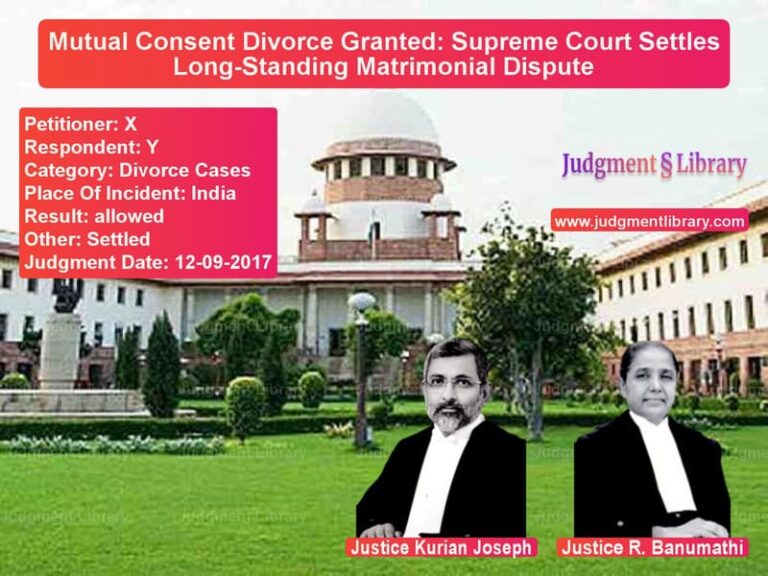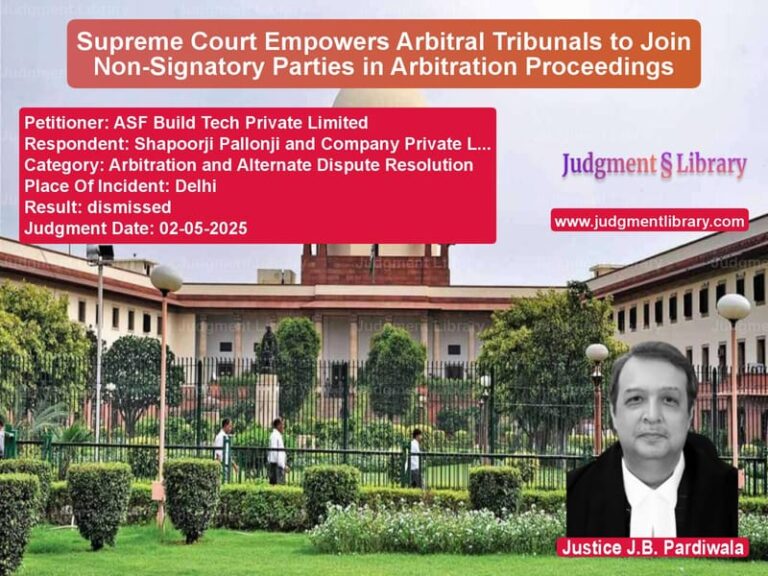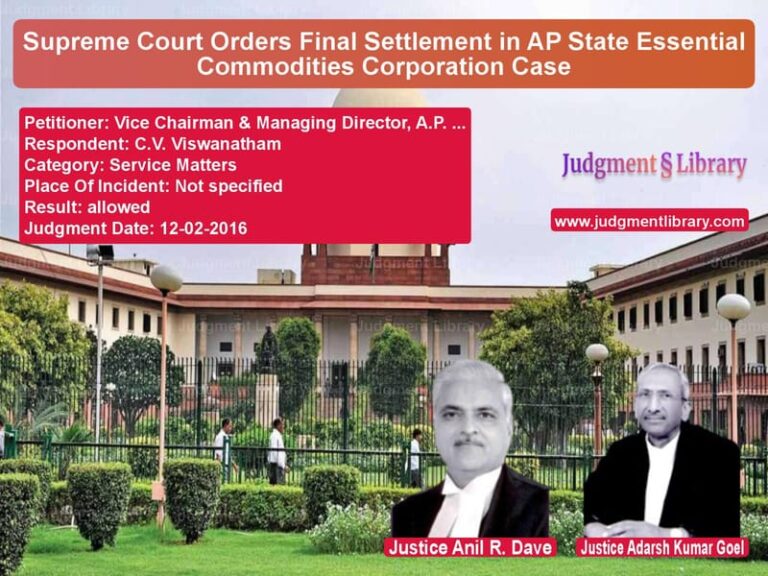Supreme Court Overrules High Court on Land Acquisition Lapse in Delhi
The Supreme Court of India recently ruled in Govt. of NCT of Delhi vs. Sushil Kumar Gupta & Ors., a significant case addressing land acquisition laws. The decision overturned a Delhi High Court ruling that had declared the acquisition process lapsed under Section 24(2) of the Right to Fair Compensation and Transparency in Land Acquisition, Rehabilitation and Resettlement Act, 2013. The Court reaffirmed that land acquisitions do not lapse merely due to non-payment of compensation if possession has been taken.
Background of the Case
The dispute concerned land acquisition proceedings initiated by the Government of NCT of Delhi in 1981. The land in question was acquired for public purposes, and physical possession was taken by the authorities on March 12, 1981. However, compensation for the acquired land was not paid to the landowners.
The respondents, Sushil Kumar Gupta & Ors., filed a writ petition in the Delhi High Court, contending that since compensation had not been paid, the acquisition was deemed to have lapsed under Section 24(2) of the 2013 Act.
Read also: https://judgmentlibrary.com/supreme-court-quashes-property-auction-due-to-procedural-violations/
Arguments by the Appellant (Govt. of NCT of Delhi)
The government challenged the High Court’s ruling, arguing:
“The High Court wrongly applied the law by declaring the acquisition lapsed merely on the basis of non-payment of compensation, despite possession having been taken.”
- The Supreme Court had already ruled in Indore Development Authority vs. Manoharlal (2020) that land acquisition does not lapse if possession has been taken, even if compensation is not paid.
- Since physical possession was taken in 1981, the acquisition process remained valid.
- The High Court’s reliance on Pune Municipal Corporation vs. Harakchand Misirimal Solanki (2014) was incorrect, as that judgment had been overruled.
Arguments by the Respondent (Sushil Kumar Gupta & Ors.)
The respondents argued that:
“Under Section 24(2) of the 2013 Act, if compensation is not paid, the acquisition process should be deemed lapsed, entitling the landowners to fresh compensation.”
They further contended:
- The authorities had failed to compensate them despite taking possession.
- The High Court had correctly ruled that inaction by the government should not deprive landowners of their rights.
- The principle of fairness required that landowners should receive compensation under the 2013 Act.
Supreme Court’s Observations
The Supreme Court relied on the Constitution Bench ruling in Indore Development Authority vs. Manoharlal (2020), which held:
“The deemed lapse of land acquisition proceedings under Section 24(2) of the 2013 Act takes place only where possession has not been taken and compensation has not been paid.”
The Court made the following key observations:
- Section 24(2) requires both possession to be not taken and compensation to be not paid for acquisition to lapse.
- Since possession was taken in 1981, the acquisition remained valid despite the non-payment of compensation.
- Deposit of compensation in a government account is sufficient and does not require direct payment to the landowner.
Final Judgment
The Supreme Court ruled:
- The Delhi High Court’s judgment was quashed.
- The land acquisition did not lapse under Section 24(2) of the 2013 Act.
- The appeal by the Government of NCT of Delhi was allowed.
- The respondents were not entitled to claim fresh compensation.
Implications of the Judgment
This ruling clarifies key aspects of land acquisition law:
- Possession Matters More Than Compensation: Once possession is taken, non-payment of compensation does not nullify the acquisition.
- Precedent Overrules High Court Rulings: Lower courts must follow Supreme Court precedents on land acquisition law.
- Preventing Misuse of Section 24(2): The judgment prevents landowners from using technical loopholes to challenge decades-old acquisitions.
Conclusion
The Supreme Court’s ruling in Govt. of NCT of Delhi vs. Sushil Kumar Gupta & Ors. strengthens the legal framework surrounding land acquisitions. By overturning the High Court’s ruling, the judgment ensures that government acquisitions remain valid if possession is taken, even if compensation is delayed.
Petitioner Name: Govt. of NCT of Delhi.Respondent Name: Sushil Kumar Gupta & Ors..Judgment By: Justice M.R. Shah, Justice C.T. Ravikumar.Place Of Incident: New Delhi.Judgment Date: 10-02-2023.
Don’t miss out on the full details! Download the complete judgment in PDF format below and gain valuable insights instantly!
Download Judgment: govt.-of-nct-of-delh-vs-sushil-kumar-gupta-&-supreme-court-of-india-judgment-dated-10-02-2023.pdf
Directly Download Judgment: Directly download this Judgment
See all petitions in Property Disputes
See all petitions in Public Interest Litigation
See all petitions in Contract Disputes
See all petitions in Judgment by Mukeshkumar Rasikbhai Shah
See all petitions in Judgment by C.T. Ravikumar
See all petitions in allowed
See all petitions in Quashed
See all petitions in supreme court of India judgments February 2023
See all petitions in 2023 judgments
See all posts in Civil Cases Category
See all allowed petitions in Civil Cases Category
See all Dismissed petitions in Civil Cases Category
See all partially allowed petitions in Civil Cases Category







